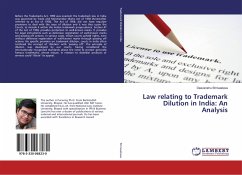Before the Trademarks Act, 1999 was enacted; the trademark law in India was governed by Trade and Merchandise Marks Act of 1958 (hereinafter referred to as Act of 1958). The Act of 1958, did not have requisite provisions to deal with the issue of dilution and it was thus upon the Courts, to include it within the Indian trademark jurisprudence. Section 47 of the Act of 1958, provides protection to well-known marks. It provides for legal instruments such as defensive registration of well-known marks and passing off actions. In various cases, Indian courts upheld rights, even without defensive registration of well-known marks through passing off actions. No specific provision on trademark dilution, courts in India often confused the concept of 'dilution' with 'passing off'. The principle of dilution was developed by our courts, having considered the internationally recognized standards about the need to protect generally famous trademarks, whose misuse, in relation to dissimilar products or services could "dilute" its appeal.
Bitte wählen Sie Ihr Anliegen aus.
Rechnungen
Retourenschein anfordern
Bestellstatus
Storno








